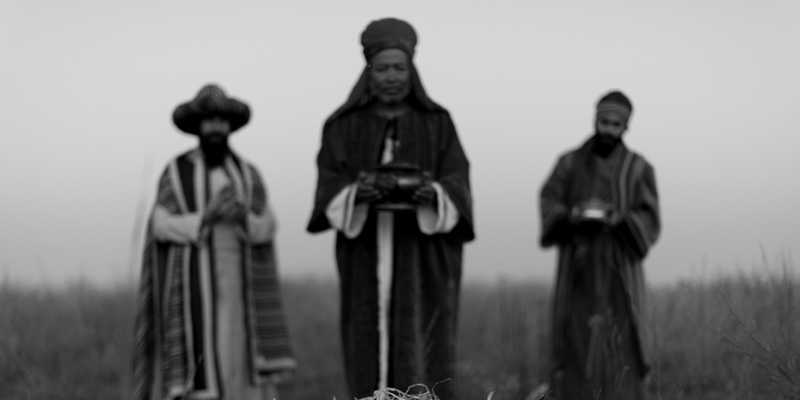
Ah Christmas! We enjoy the sights, the smells, and the sounds. We think of the angels, the manger, the shepherds and the Magi. All of them remind us of Bethlehem (and if you want the background on why it was Bethlehem, check the Book of Ruth). However, not much is generally known about the mysterious Magi who came to worship the infant Jesus.
Much of what we associate with the Magi is from early church traditions. Although the Biblical text does not number them, the basic assumption is that there were three of them as they brought three specific gifts. They are called Magi from the Latinized form of the Greek word magoi, transliterated from the Persian for a select sect of priests. Our word magic comes from the same root. By the third century, Origen iterated their names and Tertullian (AD 250) viewed them as kings. A fourteenth century Armenian tradition identifies them each as Kings: Balthasar (Arabia), Melchior (Persia), and Gasper (India).
The ancient Magi were a hereditary priesthood of the Medes, credited with profound and extraordinary religious knowledge. Some Magi, part of the Median court, proved to be expert in the interpretation of dreams, so Darius the Great established them over the state religion of Persia. It was in this dual capacity that civil and political counsel was invested with religious authority. The Magi became the supreme priestly caste of the Persian Empire, and continued to be prominent during the subsequent Seleucid, Parthian, and Sasanian periods.
Living six centuries before the birth of Christ, the Prophet Daniel certainly had an incredible number of Messianic prophecies. In addition to several overviews of Gentile world history, the Angel Gabriel told him the precise day that Jesus would present Himself as King to Jerusalem (Daniel 2, Daniel 7, Daniel 9:25-26, Matthew 21:1-9, Mark 11:1-10, Luke 19:29-30, John 12:13-15).
One of the titles given to the Prophet Daniel was Rab-Mag, the Chief of the Magi (Daniel 4:9). His unusual career included being a principal administrator in two world empires: the Babylonian, and the subsequent Persian Empire. When Darius appointed Daniel, who was a Jew, over the previously hereditary Median priesthood, the resulting repercussions resulted in the plots that led to the lion’s den. Daniel apparently entrusted a messianic vision to be announced in due time by a star, to a secret sect of the Magi, for its eventual fulfillment. It is significant that Daniel’s founding of a secret sect of the Magi also had a role in having these prominent Gentiles present gifts at the birth of the Jewish Messiah.
Since the days of Daniel, the fortunes of both the Persian and the Jewish nations had been closely intertwined. Both nations had, in their turn, fallen under Seleucid domination in the wake of Alexander’s conquests. Subsequently both had regained their independence, the Jews under Maccabean leadership, and the Persians in the Parthian Empire.
It was at this time that Magi duties included the absolute choice and election of the king of the realm. It was a group of Persian-Parthian king makers who entered Jerusalem in the latter days of the reign of Herod. Herod’s reaction was understandably one of fear when one considers the background of Roman-Parthian rivalry that prevailed during his lifetime. The promise of a divinely imposed world dominion at the hands of a Jewish monarch was more than acceptable to the Persians. After all, much of their own Persian and Medo-Persian history was studded with Jewish counselors, ministers, and nobles.
In Jerusalem the sudden appearance of the Magi, traveling in force, with oriental pomp, accompanied by an adequate cavalry escort to insure their safety, would certainly alarm Herod and the populace of Jerusalem. They were afraid these Magi might be attempting to create a border incident, which could bring swift reprisal from Parthian armies. The Magi’s request of Herod regarding the one who has been born King of the Jews was a calculated insult to him – Herod was not a Jew, but an Edomite, and had bribed and wormed his way into office. Consulting his scribes, Herod discovered from the prophecies in the Tanach (the Old Testament) that the Promised One – the Messiah – would be born in Bethlehem (Micah 5:2). Hiding his concern and feigning sincere interest, Herod requested the Magi to let him know their findings so that he, too, could worship (Matthew 2:7-8).
After finding the babe and presenting their prophetic gifts, the Magi were warned in a dream not to return to Herod, and so they departed to their own country by another route (Matthew 2:9-12).
Their gifts of gold, frankincense, and myrrh are prophetic. Gold speaks of His Kingship: He is our King; frankincense was a spice used in the priestly duties: He is our High Priest; and myrrh was an embalming ointment signifying His death: He is our Savior. When he comes again to reign, He will again receive the gifts of gold and frankincense…however this time no myrrh, as His death on the cross conquered death once and for all!
This article was written by parishioner Russ Hollingsworth.
